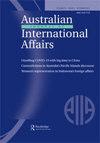认真对待治国之道:艾伦·金格尔重塑澳大利亚外交政策的遗产
IF 1.8
3区 社会学
Q2 INTERNATIONAL RELATIONS
引用次数: 0
摘要
点击放大图片点击缩小图片披露声明作者未发现潜在的利益冲突。注1在这次演讲中,艾伦将治国之道描述为“目的和手段的匹配,目标和手段的优先次序”。他问道:“在未来的碎片化时期,澳大利亚需要什么样的国家能力?我们如何发展这些能力?”显然,我们需要使我们在世界上具有分量的经济实力和支持有效军事力量的能力。我们需要保持社会韧性,使澳大利亚人团结在基本的民主价值观之下。这是治国之道。外交政策利用了国家所有可用的工具,其中许多工具位于更广泛的社区。正如大卫·基卡伦在2007年所定义的那样:“治国之道是在国内和国际背景下确定和追求国家目标的艺术。”它比国内或国际关系更大,比国家安全、经济或社会政策更广泛。它是个人、民族、国家及其所有内部和外部关系的概念性结构(也许没有明确说明),它统一了所有政策领域的方法。治国方术的概念在个人的头脑中形成了“澳大利亚”的概念,这种概念推动了许多不同领域的行动。有效的治国之道是建立在所有国家力量来源的相互作用的基础上的,包括政治、军事、经济、科技、社会、工业和信息力量。其外在影响表现在外交、信息、军事和经济四个基本维度。休·派珀(hugh Piper)是亚太发展、外交与防务对话(AP4D)的项目负责人。梅利莎·康利·泰勒是亚太发展、外交与防务对话(AP4D)的执行主任。本文章由计算机程序翻译,如有差异,请以英文原文为准。
Taking statecraft seriously: Allan Gyngell’s legacy in reimagining Australian foreign policy
Click to increase image sizeClick to decrease image size Disclosure statementNo potential conflict of interest was reported by the author(s).Notes1 In this speech, Allan described statecraft as ‘the matching of ends and means, the prioritising of objectives and instruments’. He asked, "What sort of national capabilities will Australia need in the fragmented period ahead and how can we develop them? Obviously, we need the economic strength that gives us weight in the world and the capacity to support an effective military force. We need to preserve the social resilience that keeps Australians united behind fundamental democratic values. That is the business of statecraft. Foreign policy draws on all the available instruments of the state, and many that lie in the broader community."2 As David Kilcullen defined it in 2007: ‘Statecraft is the art of defining and pursuing national objectives in their domestic and international contexts. It is larger than domestic or international relations, and broader than national security, economic or social policy. It is a (perhaps un-stated) conceptual construct of the individual, the nation, the state and all their internal and external relationships, which unifies approaches to all areas of policy. Notions of statecraft inform a conception of ‘Australia’ in the minds of individuals that drives actions across many disparate fields. Effective statecraft is based upon the interplay of all sources of national power – including political, military, economic, scientific and technological, social, industrial and informational power. Its external aspect is expressed in four basic dimensions of influence: diplomatic, informational, military and economic.’Additional informationNotes on contributorsHugh PiperHugh Piper was Program Lead at the Asia-Pacific Development, Diplomacy & Defence Dialogue (AP4D).Melissa Conley TylerMelissa Conley Tyler is Executive Director at the Asia-Pacific Development, Diplomacy & Defence Dialogue (AP4D).
求助全文
通过发布文献求助,成功后即可免费获取论文全文。
去求助
来源期刊

Australian Journal of International Affairs
INTERNATIONAL RELATIONS-
CiteScore
3.20
自引率
13.30%
发文量
44
期刊介绍:
AJIA is the journal of the Australian Institute of International Affairs. The Institute was established in 1933 as an independent and non-political body and its purpose is to stimulate interest in and understanding of international affairs among its members and the general public. The aim of the Australian Journal of International Affairs is to publish high quality scholarly research on international political, social, economic and legal issues, especially (but not exclusively) within the Asia-Pacific region. The journal publishes research articles, refereed review essays and commentary and provocation pieces. ''Articles'' are traditional scholarly articles. ‘Review essays’ use newly published books as the basis to thematically examine current events in International Relations. The journal also publishes commentaries and provocations which are high quality and engaging pieces of commentary, opinion and provocation in a variety of styles. The Australian Journal of International Affairs aims to analyse international issues for an Australian readership and to present Australian perspectives to readers in other countries. While seeking to stimulate interest in and understanding of international affairs, the journal does not seek to promote any particular policies or approaches. All suitable manuscripts submitted are sent to two referees in a full ''double blind'' refereeing process.
 求助内容:
求助内容: 应助结果提醒方式:
应助结果提醒方式:


